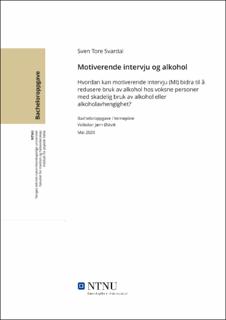| dc.contributor.advisor | Østvik, Jørn | |
| dc.contributor.author | Svardal, Sven Tore | |
| dc.date.accessioned | 2020-07-11T16:01:29Z | |
| dc.date.available | 2020-07-11T16:01:29Z | |
| dc.date.issued | 2020 | |
| dc.identifier.uri | https://hdl.handle.net/11250/2663779 | |
| dc.description.abstract | Introduksjon: Som helsepersonell har man et ansvar for å ta vare på selvbestemmelse hos de man jobber for. Samtidig så skal man ta vare på både psykisk og fysisk helse. Hvilke arbeidsverktøy har man når en pasient eller bruker har et uheldig atferdsmønster som kan skade helsen?
Hensikt: Hensikten med studien er å se på motiverende intervju som et arbeidsverktøy i sammenheng med å redusere alkoholforbruk. Studien forsøker å finne ut noe om effekten av motiverende intervju og metodens aktive komponenter.
Metode: Denne oppgaven er en litteraturstudie
Resultat: I studien var det tre gjennomgående temaer som gikk igjen. Effekt, allianse og retning (den målrettede delen av motiverende intervju).
1) Effekt: Motiverende intervju kan ha effekt på å redusere alkoholforbruk hos personer som har skadelig bruk og/eller er avhengige av alkohol.
2) Allianse og retning: Flere av artiklene jeg fant tyder på at allianse (relasjon mellom hjelper og klient) og retning er sentrale og aktive komponenter i motiverende intervju som kan ha effekt på å redusere alkoholforbruk.
Konklusjon: Motiverende intervju kan ha en effekt til å reduser alkoholforbruk hos personer som har et skadelig alkoholforbruk eller er avhengige av alkohol. Sentrale drivkrefter i dette er alliansen mellom hjelper og retningen samtalen tar. Personer som sliter med alkohol er ofte ambivalente. Utforsking av drivkrefter for og imot atferden i en trygg allianse med fokus på å styrke endringssnakk og redusere motstand kan skyve vektskålen mot motivasjon for endring. | |
| dc.description.abstract | Introduction: As health care workers we have a responsibility to maintain self-determination of those people that we work for. At the same time we are also responsible for taking care of both physical and mental health. Which methods do we have in our arsenal when a patient have a behavioral pattern that can damage their health?
Aim: The aim of this study is to look at motivational interviewing as a method to reduce alcohol consumption. This study tries to determine the efficacy of motivational interviewing and its working components.
Method: This is a literature study.
Results: In this study there were three themes that were reoccurring. Efficacy, alliance and direction (the goal-oriented aspect of motivational interviewing).
1) Efficacy: Motivational interviewing can reduce alcohol consumption with persons that are either alcohol dependent and/or have a harmful use of alcohol.
2) Alliance and direction: Several of the studies I have found can show that alliance (the relationship between client and interventionist) and direction are central and active components in motivational interviewing that can reduce alcohol consumption
Conclusion: Motivational interviewing can reduce alcohol consumption with persons that are either alcohol dependent and/or have a harmful use of alcohol. The driving factors are the alliance and directional work within motivational interviewing. Persons that struggle with alcohol are often ambivalent. Investigation of the driving factors for and against a person’s behavior within a safe alliance, and strengthening change talk and reducing resistance to change, can tip the scale in favor for motivation to change. | |
| dc.publisher | NTNU | |
| dc.title | Motiverende intervju og alkohol | |
| dc.type | Bachelor thesis | |
